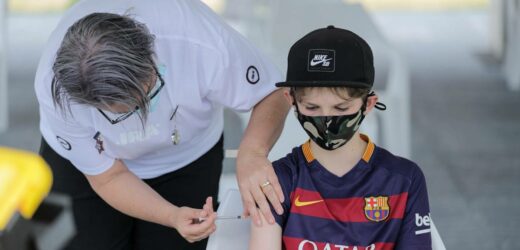Sixty-four cases have been identified at New Zealand’s border in the past two days, prompting warnings for Kiwis to prepare for an Omicron outbreak.
It’s just 21 fewer cases than those detected in the community over the same period.
Daily cases detected in MIQ facilities have been steadily climbing in the past week, often surpassing the number of daily cases emerging in the community.
It’s creating a higher risk of Omicron leaking into the community, experts have warned, but epidemiologist Michael Baker said the country is not ready for an outbreak.
Baker urged eligible adults to get their booster dose and children to get vaccinated from January 17 in preparation.
More than half a million doses of the Pfizer paediatric vaccine arrived in New Zealand on the weekend, meaning children aged 5-11 will be eligible for their first dose from next Monday.
The Ministry of Health is considering all new cases at the border to be of the Omicron variant, but it has not confirmed exactly how many Omicron cases there are in New Zealand.
Whole-genome sequencing efforts have been shifted to focus on border-related workers and their families.
“This is where there is the greatest risk of Omicron entering the community. This new approach will help to ensure the risk of any community transmission of Omicron remains low,” the ministry said.
“These samples will be treated as urgent and tested within 12 hours of being received by the laboratory.”
Samples from international arrivals will be tested no later than 48 hours after being received.
“Now that all international arrivals are required to complete a full 10 days in a managed isolation facility and return a negative day-nine test before release, the risk of community transmission of the Omicron variant from these cases is deemed to be low,” the ministry said.
A number of infected returnees have arrived from the UK, US, India and Australia, with a significant number testing positive on day 0 or 1 of their quarantine.
Baker told Newstalk ZB on Sunday that New Zealand should try to delay the arrival of Omicron in the community “for at least a couple of months”, to give the country time to prepare.
He also said the traffic light system “isn’t going to help us a great deal with Omicron”, and that brief, localised lockdowns might have to be considered.
“If we had a very intense Omicron outbreak in Auckland, which is probably the most likely place where it would start, we’d have to think about not overwhelming the health system. And if we’re worried about that, we might need to go to an equivalent of alert level 3 again.”
Baker supported the Government’s move to shorten the gap required between people receiving their second vaccine dose and a booster dose from six months to four.
He also stressed the importance of vaccinating children quickly before an Omicron outbreak, to minimise the harm for them and to add to population immunity.
“They are the two most important things,” Baker said.
Immunisation for children starts on Monday, January 17, and they will need two doses of the vaccine to be fully protected.
There are about 476,000 children aged 5-11, so the supply will be more than sufficient for them all to get their first dose.
The ministry recommends these are given at least eight weeks apart, but has said the interval can be safely shortened to a minimum of 21 days if needed.
A parent, caregiver or legal guardian will need to accompany the child to their immunisation appointment and provide consent for them to receive the vaccine, which will be free.
Meanwhile, 85 new community cases of Covid-19 were picked up over the past two days: 57 in Auckland, seven in Waikato, one in Taranaki, 16 in Bay of Plenty, two in Lakes and two in Wellington.
Two Wellington cases were linked to recent travel to the Bay of Plenty, and locations of interest have been released over the weekend – including a drum & bass festival held in Tauranga.
Festivalgoers who attended the Netsky, Hybrid Minds, Montell2099, Friction, Holy Goof, Koven & more event at Wharepai Domain on January 3 from 2pm to midnight have been advised to self-monitor for symptoms for 10 days.
A number of establishments in Rotorua, Taupō, Waihi, Tauranga, Queenstown and West Auckland were also listed on Sunday.
Patrons at the Village Sports Bar & Cafe in Rotorua, Eastside Tavern and TAB Gaming Lounge in Hamilton, and the Waihi Beach RSA and the Waihi Beach Hotel Pub are being considered close contacts of cases.
Source: Read Full Article

/cloudfront-ap-southeast-2.images.arcpublishing.com/nzme/YQWQJVBWFR4YZCCXQLTXET4R3U.jpg)
/cloudfront-ap-southeast-2.images.arcpublishing.com/nzme/7H665TXIGXN2HIHZ4HIWI4GQW4.jpg)

